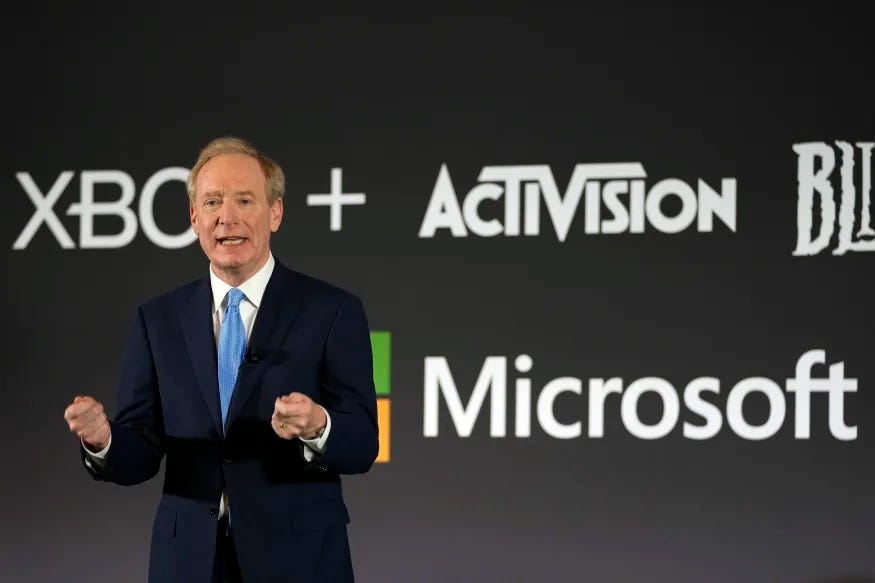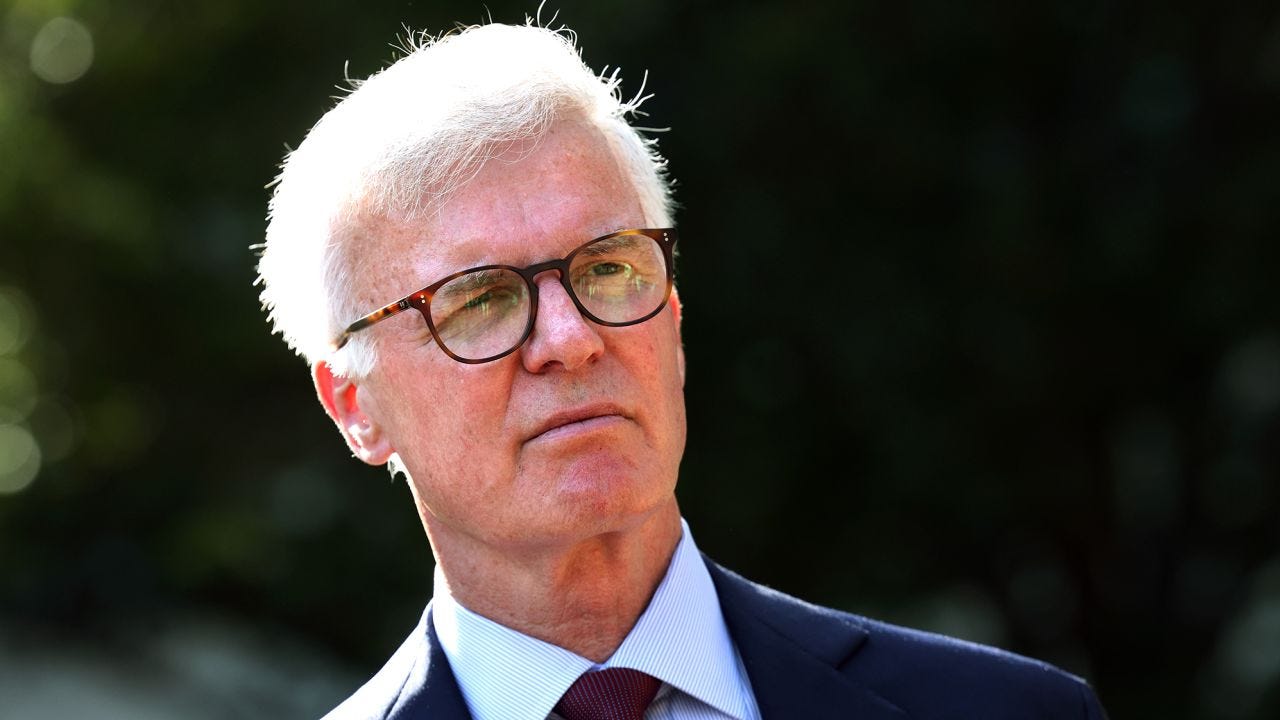
Stuff Worth Knowing for the Week of June 12, 2023
Instant Pot's owner files for bankruptcy, Twitch makes more mistakes, and The Washington Post's publisher steps down.
Welcome back to Stuff Worth Knowing! Each week, I'll round up news related to tech, video games, film, television, anime, and more.
Tech ⌨️
Instant Pot Company Files For Bankruptcy
The biggest story of the week is about a company that’s almost ubiquitous in terms of the products it provides, but also one about the cancer of corporate growth above all else. Instant Brands is the company behind Instant Pot, Pyrex, Snapware, and CorningWare. This week, Instant Brands filed for Chapter 11, hoping to obtain $132.5 million in funding to remain in business.
Instant Brands and Corelle Brands merged back in 2019, with a valuation of $2 billion for the combined entity. And times were good, especially once the pandemic hit and everyone was homebound. The primary issue ahead of Instant Brands is a familiar one: sales boomed during the pandemic, only to wane immediately after. Everyone needs Pyrex or an Instant Pot, but you don’t really need more than one.
Now Instant Brands has more than $500 million in debt, after a number of failed attempts to expand the Instant brand to other appliances. While an Instant Pot is a great product, not many needed an Instant Oven, Instant Vortex air fryer, or new, improved Instant Pot. Part of that debt wasn’t due to company operations, however. Instant Brands was purchased by Cornell Capital in 2017, via a leveraged buyout meaning extra debt was taken on to make the purchase. And now that debt is hitting harder as interest rates rise, something Instant Brands CEO Ben Gadbois acknowledged in a press release.
“In particular, tightening of credit terms and higher interest rates impacted our liquidity levels and made our capital structure unsustainable,” he explained.
Why It's Worth Knowing: Instant Brands was just a company that offered a great product. Not one that needed to grow, merge, or diversify its product line. The company just needed to be big enough to keep making Instant Pots. And honestly, there are a number of companies that are like that. Not everything can grow, and that desire on the corporate side is a problem. The cautionary tale isn’t being heard, seemingly.
Google Sells Domains To Squarespace
Google is leaving behind another business. On Thursday, Squarespace announced that it would be acquiring Google Domains for $180 million. Domains was Google’s shot at domain name registration.
While being a registrar no longer interests Google, it’s a key part of Squarespace’s business. “Domains are a critical part of web infrastructure and an essential piece of every business’s online presence. We look forward to serving these new customers as we have served millions using our domain products and are committed to ensuring a seamless transition,” said Squarespace founder and CEO Anthony Casalena.
Why It's Worth Knowing: With the acquisition, Squarespace becomes one of the largest domain name registrars worldwide. It jumps up to fourth place, largely on the back of Google Domains’ customers. (GoDaddy is far and away the biggest.) It’s not a business with big margins, but it is one that aligns well with Squarespace’s website building capabilities.
Reddit CEO Doubles-Down on Paid API, Threatens Mods, and Praises Musk
This week, a number of communities within Reddit participated in a blackout, with moderators closing their subreddits for a day or two. The blackout was to protest Reddit’s proposed paid API system, which is leading to a number of apps shutting down entirely due to exorbitant pricing. Last week, Reddit CEO Steve Huffman took part in an Ask Me Anything (AMA), where he did little to mollify users.
This week, Huffman talked to the mainstream press instead. He explained to The Verge that the blackouts ultimately aren’t going to do anything about the paid API system, calling that a business decision. “We’ve had blackouts in previous times where there’s a little more room for movement. But the core of this one is the API pricing change. That’s our business decision. And we’re not undoing that business decision,” Huffman said. “What’s not happening is us continuing to subsidize businesses built on taking our data for free. That’s not changing.”
In an interview with NBC News, Huffman did little to plead his case and probably made a few additional enemies. First, he stated that he wants to create new rules that allow subreddit users to vote out moderators, almost a direct threat to those behind the blackout.
“If you’re a politician or a business owner, you are accountable to your constituents. So a politician needs to be elected, and a business owner can be fired by its shareholders. And I think, on Reddit, the analogy is closer to the landed gentry: The people who get there first get to stay there and pass it down to their descendants, and that is not democratic,” he stated.
Huffman said his real thrust is “making sure that, for example, the protests, now or in the future, are actually representative of their communities. And I think that may have been the case for many at the beginning of this week, but that’s less and less the case as time goes on.”
Of course, Reddit doesn’t pay moderators and the blackout did, in fact, reflect the feelings of many of Reddit’s users, as shown in the AMA. Really, his aim is finding a way to end some ongoing blackouts without looking like he’s cracking down.
Huffman also talked about Elon Musk’s extensive layoffs and moves at Twitter, calling his actions “reaffirming”. “Long story short, my takeaway from Twitter and Elon at Twitter is reaffirming that we can build a really good business in this space at our scale. And then I think one of the non-obvious things that Elon showed is what I was hoping would be true, which is: You can run a company with that many users in the ads business and break even with a lot fewer people. They had to do some pretty violent changes and violent surgery to get there,” Huffman said.
That’s a rather callous take on cutting staff from around 8,000 to 1,500. I’m not sure exactly how you can ever call that “reaffirming”.
Why It's Worth Knowing: Reddit is following Twitter down into the pit. In both cases, management is trying to monetize social media, where most of the primary draw of the platform comes from unpaid users outside of those companies’ structure. Trying to draw every tiny bit of revenue out of the platform doesn't actually provide any value, and risks ultimately losing what makes the platform work in the first place.
This Week in Twitter: Twitter Pivots To Video
It’s back! This week, Twitter owner Elon Musk and its new CEO, Linda Yaccarino, outlined the future of the platform to investors. Reuters was able to obtain slides from the presentation, which was meant to calm investors. Yaccarino said that ad spending it up on Twitter in several categories.
The pair also told investors that a stronger focus on video was coming, with vertical video accounting for more than 10% of time spent on Twitter. It’s hard to tell what Twitter thinks it can add in this space that’s not already taken up by the competition. It’s also probably hard to pivot to video when you’re shutting down server infrastructure.
Twitter is also apparently applying for licenses to transmit money in all 50 U.S. states. The latter leans into Musk’s desire to make Twitter an “everything” app, with social media, finance, and shopping functions in a single app. Of course, this requires a foundation of trust, something Musk doesn’t have from a ton of consumers.
As Twitter tries to expand and monetize, music publishers are coming for it. On Wednesday, a group of 17 music publishers filed a lawsuit against Twitter, accusing it of copyright infringement. The suit is seeking up to $250 million in damages, according to the New York Times. The publishers allege that Twitter is doing next to nothing to police copyright infringement on its platform, which is probably true. They also state that Digital Millennium Copyright Act notices sent to Twitter have been either ignored or seen a delayed response. This is probably only the beginning of the legal trouble ahead of Twitter.
Video Games 🎮
Judge Temporarily Blocks Microsoft Acquisition of Activision-Blizzard
A federal judge has sided with the Federal Trade Commission (FTC), as the regulatory agency seeks to block Microsoft’s acquisition of Activision-Blizzard. On Monday, the FTC filed for a temporary restraining order and injunction to prevent Microsoft from completing the acquisition.
On Wednesday, The Verge reported that the court agreed to the temporary restraining order while it considered the injunction. There will be a two-day hearing on the injunction on June 22 and 23, with the court likely deciding afterward. Microsoft asked the court to speed up the timeline according to Reuters, arguing that the FTC’s injunction and full review would take forever and essentially kill the deal.
Microsoft and Activision-Blizzard also filed a joint opposition to the FTC’s preliminary injunction request. Florian Mueller of FOSS Patents has a full look at that document, and Mueller seems to come down on Microsoft’s side in regards to the arguments. Will the court agree? We’ll see.
Twitch Introduces New Partner Revenue Split, But The Walls Are High
As promised, live streaming service Twitch introduced its new Partner Plus program, giving creators a 70% share on net subscription revenue. The program will offer the share on revenue from recurring monthly subscriptions for 12 months, up to $100,000. The trick is that qualifying for the program requires a subscription count of 350 recurring paid subscriptions for three consecutive months, not counting Amazon Prime or gift subscriptions.
Some creators have pointed out the qualifications are pretty difficult, as many visitors use Prime or gift subscriptions for their favorite creators. Twitch partner Lowco pointed out that by current stats, only 1,066 Partners would qualify for the new Partner Plus program.
Twitch introduced the program because of growing competition. Meta is not taking any fees from Facebook Gaming subscriptions until 2024, while YouTube Gaming already has a 70% split on all viewer memberships and superchats. A new streaming platform, Kick, has a 95% revenue split for creators.
Why It's Worth Knowing: Sometimes a platform misses why it grew in the first place. Twitch is slow to make the changes that creators are looking for and the competition is growing each day. Creators are moving to other platforms, whether that’s because of Twitch’s rules about things like simulcasting or lucrative deals elsewhere. Speaking of the latter…
Streamer xQc Signs Two-Year, $70 Million Deal With Kick
According to the New York Times, Twitch streamer Felix “xQc” Lengyel has signed a $70 million contract with rival streaming platform Kick. The deal is for two years, with potential incentives pushing the total up to $100 million.
Where’s the money coming from? Kick was co-founded by Ed Craven, who also co-founded Stake.com, a crypto gambling site. The sites aren’t directly connected, but it’s likely that Stake’s business is funding part of Kick. It also looks like one of Kick’s main goals is to funnel traffic toward the gambling site.
If Kick is paying out $70 million deals for streamers, one has to wonder how sustainable the site truly is. Perhaps Stake’s business is enough to keep it afloat, but throwing money around like this recalls Microsoft’s Mixer service, which also spent on big names before shuttering entirely. Kick has several additional problems, like streams with copyrighted content, fake views, and poor overall content moderation, leading to porn, racism, homophobia, and more.
Why It's Worth Knowing: Mixer was founded in 2016, started paying out big in 2019, and was shuttered by 2020. Will Kick follow a similar trajectory? One has to assume so, especially if it’s paying that much to a single creator: that’s a sports contract for game streaming. Perhaps Kick and Stake are simply elaborate money-laundering schemes that just need a public face. Regardless, creators are moving to the platform for the revenue split alone, and that’s before the contracts start really getting thrown around.
Embracer Group Restructures After Major Deal Falls Through
Speaking of sustainability, Embracer Group has announced that it will be restructuring to find cost savings. From 2017 until today, Embracer Group was on a run of acquisitions, picking up Koch Media, Coffee Stain Studios, Saber Interactive, Gearbox Software, Perfect World Entertainment, Crystal Dynamics, Beamdog, and more. It even picked up Middle-Earth Enterprises, giving it access to the film, stage and merchandising rights for The Hobbit and The Lord of the Rings. The money seemed endless, until it wasn’t.
This week, Embracer Group announced that there will be a restructuring, which will involve consolidation and layoffs across the company. The news comes after Embracer’s fourth quarter 2022/23 financial report, which revealed that the company was planning on closing a $2 billion, six-year strategic partnership, only to see the deal fall through.
“The deal would have enabled a catch-up payment at closing for already capitalized costs for a range of large-budget games, but also notably improved medium-to-long-term profit and cash
flow predictability for the duration of the game development projects,” said the company. “The transaction had many of the highest rated global advisories onboard with several hundred people engaged on both sides. All documentation was finalized and ready to go as of yesterday. We asked for the execution of the agreement before our Q4 announcement. However late last night we received a negative outcome from the counterparty.”
Which brings us to this week. Basically, Embracer Group has finally had to acknowledge that owning a bunch of random studios with no clear vision and tons of redundancies is probably not a great idea.
“We have acquired some of the world’s leading entertainment IP and we have invested into one of the largest pipelines of games across the industry. The program presented today will transform us from our current heavy-investment-mode to a highly cash-flow generative business this year,” said CEO Lars Wingefors in the open letter to employees. “The program will lower our net debt significantly. After completion of this program, we will generate growth in profitability with less business risk and with higher margins in the PC/Console segment over the coming years.”
The restructuring has several phases, including cost savings, efficiency, and consolidation. Cost saving will likely include layoffs at several studios and the closure of some others. The open letter also states that some games will be canceled. The consolidation phase will likely see other studios merged as well.
Once again, you can’t grow forever.
Film, Television, and Streaming 🎞️
Washington Post Publisher Fred Ryan Steps Down
Last week, it was CNN CEO Chris Licht stepping down following a terrible profile in the Atlantic and a general employee backlash. This week, Washington Post publisher Fred Ryan announced that he is leaving the outlet. Ryan was at WaPo for nine years, being appointed to the position in 2014 by Jeff Bezos, a year after the Amazon founder purchased the paper.
Ryan was a former Reagan administration official and he’ll be leaving to do something in that same sphere. Ryan will be leading the Center on Public Civility, a project kicked off by the Ronald Reagan Presidential Foundation and Institute. According to the New York Times, that project is also backed by Bezos.
Like Licht, Ryan had his share of controversy in the position, though not to the same degree. Following recent layoffs, the Washington Post has lost a number of senior staff, with some pointing to Ryan as part of the problem. The Post will have an interim chief executive, Patty Stonesifer. She was previously the president and CEO of Martha’s Table and currently serves on the corporate board of Amazon. Stonesifer will remain on for two months to help Bezos find a replacement.
Why It's Worth Knowing: Much like Licht last week, this is the leadership at one of our newspapers of record in the United States. The leadership determines the resources given to those down the line, which in turn determines the overall coverage. Who ends up in this position is very important for the public sphere in the U.S.
WGA Strikes Starts Delaying Major Projects
The Writers Guild of America is still on strike, and while many television shows are already shot for the season, or producers are relying on reality shows, films are starting to run into issues. The Batman Part II already saw a production delay because of the strike, but it seems like its sister show, The Penguin, is also pausing in the middle of production. The Penguin and Marvel Studios’ Daredevil: Born Again were both in production, but hit with WGA picket lines, ultimately causing production shutdowns. (That is the point of a strike!)
At the same time, Marvel Studios looks to be using the strike to space out a few of its films. Thunderbolts and Blade were already paused, but this week Disney offered a number of updated release dates, pointing to the strike as the reason. Deadpool 3 moves to May 3, 2023, Captain America : Brave New World now bows on July 26, 2024, and Thunderbolts moves to December 20, 2024. Blade jumps back to February 14, 2025 and Fantastic Four hits on May 2, 2025. Finally, the pair of Avengers films get pushed way back, with Avengers: The Kang Dynasty now coming on May 1, 2026 and Avengers: Secret Wars dropping on May 7, 2027.
It’s not just Marvel, however. Avatar 3 was supposed to drop in December 2024, but now will release on December 19, 2025. Its sequels jump back to December 21, 2029 and December 19, 2031. That’s right, eight years from now! Star Wars also moves, with one untitled film coming on May 22, 2026 and another on December 18, 2026.
It’s likely that Disney won’t be the only studio to use the strike to delay certain projects and backburner others. Especially when you’re seeing dire box office returns across the board like this weekend, it seems Hollywood probably needs to take a knee and pay its writers to deliver the best scripts possible.
Amazon Freevee Is Offering 23 More FAST Channels
Amazon Freevee is Amazon’s free, ad-supported streaming service. In addition to Ad-Supported Video on Demand (AVOD), Freevee also offers a number of free, ad-supported television (FAST) channels. These operate like old linear TV channels, running 24/7 with ads. Some of Freevee’s offerings are versions of linear channels, like ABC News Live; sports-focused like PGA Tour; or dedicated to a single show or franchise, like Top Gear or Criminal Minds.
Amazon announced this week that it’s adding another 23 channels for Freevee. These channels will come from Amazon’s subsidiary MGM and Warner Bros. Discovery. According to Deadline, the wide-ranging channels include MGM Presents, MGM Presents: Action and MGM Presents: Sci-Fi, while the single franchise channels will include The Pink Panther, Stargate, Green Acres, and The Outer Limits. WDB will be bringing its absolute best to bear, with new channels focused on Cake Boss, Extreme Couponing, Ghost Brothers, Paranormal Lockdown, Say Yes to the Dress, and Long Lost Family.
Why It's Worth Knowing: FAST streaming has been growing quickly year-over-year. It really started taking off in 2020 according to Variety, and since then, producers have realized where the format’s strength lies: While certain shows and films won’t provide a ton of heat to subscription streaming services, they can make money on a linear stream with ads. You might not search out Cake Boss on Max, but are likely to just leave the Cake Boss FAST channel on in the background while you do other things.
Services like Tubi, Pluto, and The Roku Channel have been quietly making money with little fanfare, providing services that look oddly like the cable TV we all cut cords to run away from. Which is to say the future of streaming TV looks like the past of regular TV.
The Shout Out: If you want to know more about FAST streaming, The Verge has a pretty comprehensive article on the topic.
On My Mind 🧠
Marvel Artist John Romita Sr. Dies: The man who made Peter Parker hot is sadly dead. On Wednesday, artist John Romita Jr. announced that his father, John Romita Sr., had passed away. He died at the age of 93, passing away peacefully in his sleep according to his son. Romita worked at both DC and Marvel Comics, starting as an artist on Daredevil before eventually replacing Steve Ditko on The Amazing Spider-Man. He worked on some of the biggest issues ever, including the reveal of Norman Osborn as the Green Goblin, the first actual appearance of Mary Jane Watson, and the “Spider-Man No More” issue.
Seven years later, Romita rose to become Art Director at Marvel, contributing to its house style and helping to design characters like Wolverine, Luke Cage, Bullseye, and Monica Rambeau. Romita downplayed his considerable talent in an interview with the Comics Reporter.
No matter what success I've had, I've always considered myself a guy who can improve on somebody else's concepts. A writer and another artist can create something, and I can make it better. That's the way I've always thought of myself. I don't consider myself a creator. I've created a lot of stuff. But I don't consider myself a real creator in a Jack Kirby sense. But I've always had the ability to improve on other people's stories, other people's characters. And I think that's what's made me a living for 50 years.
May he rest in peace.
Amazon’s Citadel Fails To Make An Impact: Amazon went all-in on Citadel, its globe-spanning spy series starring Priyanka Chopra Jonas and Richard Madden. Problem is the series has failed to make any sort of major impact. It didn’t appear on the recent Nielsen streaming charts, despite the major rollout. Amazon Studios Head of Drama Series Odetta Watkins acknowledged the failure, but downplayed it according to Deadline.
I think the show was conceived to be able to speak to the world and it has. Every show is not going to hit in every place on the same level. But as the franchise grows, I feel like the numbers will grow all over, including domestically. You’ll start to see the audience respond differently as it goes on.
The Flash Bombs Out At The Box Office: As of this writing, The Flash is looking to make $55 million at the domestic box office this weekend. That’s below Black Adam, which most folks took as a bit of a failure. Whether it’s because of the issues surrounding star Ezra Miller, the lack of faith in the DCEU, or the supposedly terrible CGI, audiences turned on the film. The CinemaScore was a B and the PostTrak recommend was at 59%, putting it on par with some of the other duds in the DCEU, including Batman v Superman.
Audience ratings seem fine, but the reception is dire, a far cry from WBD sentiment. When he revealed his new DC Universe film slate, new DC Studios co-boss James Gunn talked up The Flash:
I will say here that Flash is probably one of the greatest superhero movies ever made.
Well, maybe not.
















